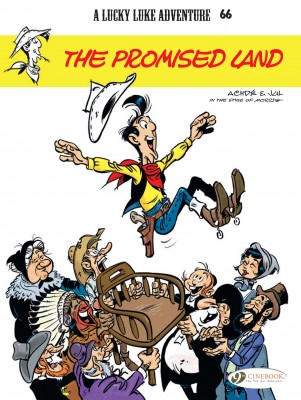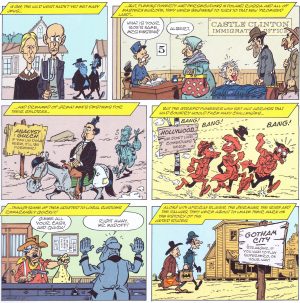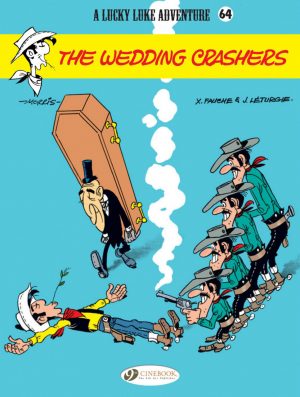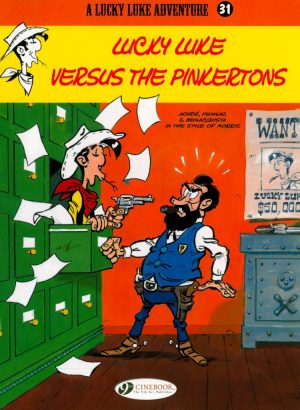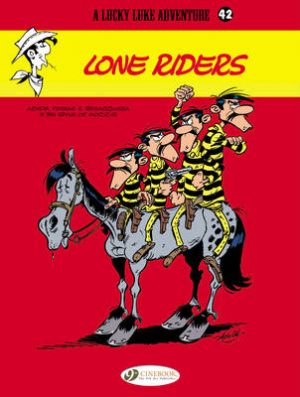Review by Jamie McNeil
Yubel: “Have you ever camped, Zayde?”
Moishe: “Not personally, but some people in my family have…”
Rachel: “Yes, well, that was 3,500 years ago in Egypt, Moishe!”
Hapless Jack has the reputation of being the unluckiest cowboy to herd steers, so bad that cattle run away at the sight of him. Introduced here as one of Lucky Luke’s closest friends, he has a big favour to ask. Jack has a chance to redeem himself with a job in Texas, but his family is arriving from Eastern Europe at the same time so would Luke escort his family from St. Louis all the way to Chelm City, Montana? Well, of course Luke would, but Jack warns him that his family has more than a few very odd quirks. You see, Jack and his family are Jews and while Jack keeps that to himself, his family declare it proudly for all to see. Luke and Jolly Jumper set off to meet Jack’s family, but they’ll find more than they bargained for. While most immigrants are willing to adapt to the West, Jack’s parents Moishe and Rachel, accompanied by their grandchildren Hanna and Yubel, are insistent that the West adapt to them. It’s a long way to Chelm City, crossing deserts, wilderness, rivers and Indian country, but those things are the least of Luke’s worries as he has to contend with attempts to over feed him and marry him off, while navigating tricky religious observances and dangerous con-men. Oi Vey!
The Promised Land is essentially a fun look at the influence the historical Jewish diaspora has had on America. It’s an oddity, feeling simultaneously like a Monty Python or Mel Brooks sketch yet, distinctly redolent of Goscinny’s Lucky Luke output on, say, Western Circus or The Stagecoach. That’s because writer Jul has been influenced by all these artists, distilling it into a funny yet sensitive story. It’s likely you will learn things about Judeo culture you didn’t know over the course of 40 pages, Jul having done the research, even including the introduction of Yiddish to American Jews. Most laughs arise from stereotypes or situational comedy, though the late 19th Century setting removes any sense of anti-semitism.
The comedy works best when artist Achdé works with Jul’s script hybridising Judaic culture, famous Western tropes and (surprisingly) pop culture references. One scene has a thug making someone dance by shooting at their feet, Achdé’s illustrations making it witty fun. Another introduces entertainers and scientists with Jewish roots. Achdé’s strength lies in his characters, his landscapes straightforward but his panels full of people with rich individuality, crowding round campfires or saloons, are superb. We’ve become a society that is often concerned about offending someone and there is a real danger here, but it doesn’t feel like that here despite this being a recent Lucky Luke story. The sticking point comes from the creators including jokes that are essentially Franco-Judeo and therefore unique to French culture. Translator Jerome Saincantin does his best to explain this in a foreword, admitting the difficulty of transfering to English. For his part, Saincantin has done well despite this, and gone to the trouble of running the cultural references past the right people to transfer the accuracy.
All together The Promised Land does shine. Achdé’s work is outstanding as always while Jul’s writing evokes the spirit of Lucky Luke from the days of Morris and Goscinny. Hopefully this isn’t the last we see of the creative pairing. Chronologically Cinebook follow this with Belle Starr.
